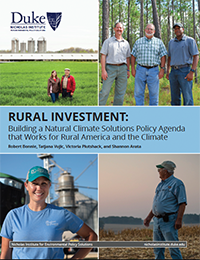Policies that Invest in Rural America Will Allow Natural Climate Solutions to Take Hold, Nicholas Institute Report Shows

DURHAM, N.C. — America’s farms, ranches and forests are vital to addressing climate change, but rural voters tend to view federal environmental policy with skepticism. A new report by Duke University’s Nicholas Institute for Environmental Policy Solutions outlines a series of natural climate solution policy ideas aimed at investing in rural communities in a way that earns their political support.
“Our forests and agricultural lands can make enormous contributions to dramatically reduce net greenhouse gas emissions in the United States,” said Robert Bonnie, executive in residence at the Nicholas Institute. “But to build political support for the policies and investments needed for our farmers, ranchers, forest owners and public land managers in doing that, we must earn broad backing among both environmental and rural stakeholders. We hope this report offers insight and a potential pathway for building a menu of policies that can both address the climate challenge and win rural support.”
The report, “Rural Investment: Building a Natural Climate Solutions Policy Agenda that Works for Rural America and the Climate,” focused on four questions to develop a list of policy options:
- Which agricultural and forestry practices result in the most significant greenhouse gas (GHG) emission reductions and sequestration, and where are those practices likely to occur?
- What are the positions of stakeholders in agriculture, forestry, hunting and fishing, outdoor recreation, and environment/conservation with regard to climate policy on agricultural and forest lands?
- What can be learned from state experience with natural climate solutions?
- What suite of federal policies could get the necessary GHG reductions and win rural support?
Analysis showed that policies that reward only landowners and agricultural and forestry producers who can significantly reduce GHGs likely will not earn enough support from rural Americans to achieve the needed scale of investments in natural climate solutions. To win broader support, federal policy should consider a suite of investments in agriculture and forestry focused on more than just GHG mitigation, including but not limited to creation of meaningful and higher-paying jobs, climate resilience, agricultural and forest productivity, and non-climate environmental benefits, such as clean water.
The report examines the feasibility of several specific policy options for meeting this goal, including carbon offsets, a carbon bank, Farm Bill conservation programs, and tax incentives for financing natural climate solutions. In addition, Congress should also examine investments in sustainably produced bioenergy, including renewable natural gas; forest products markets; and agricultural and forestry jobs.
Any plan for the United States to meet aggressive climate goals will require farmers, ranchers, forest owners and public land management agencies to implement natural climate solutions on hundreds of millions of acres of land. Forests absorb the equivalent of 11–15 percent of U.S. GHGs. Meanwhile agriculture accounts for about 9 percent of the country’s GHG emissions but has the potential to both reduce those emissions significantly and sequester carbon in soils, grasslands and trees.
“Farms and forests are a lynchpin of the climate equation. Greenhouse gas concentrations can’t be contained without them — and the rural places they define — reaching their full potential and quickly,” said Tatjana Vujic, assistant professor of the practice in the Nicholas School of the Environment and director of biogas strategy for Duke University. “This rural investment analysis reflects the types of authentic approaches that are most likely to be embraced by the real natural climate solution experts: farmers, forest landowners and other rural citizens.”
The report suggests that advocates for natural climate solutions be prepared to push for rural investments that bolster these solutions outside of comprehensive climate legislation. One potential opportunity that the authors say would have “a strong economic rationale and broad political support” is as part of an economic recovery package to significantly boost rural communities and agriculture and forestry producers hurt by the COVID-19 pandemic.
The report was written by Bonnie and Vujic with co-authors Victoria Plutshack, a policy associate with the Duke Energy Access Project, and Shannon Arata, a research analyst for the Nicholas Institute. The ClimateWorks Foundation provided funding for the work.
###
Members of the media interested in speaking with Robert Bonnie or Tatjana Vujic should contact Jeremy Ashton, jeremy.ashton@duke.edu or 919.613.4361.

